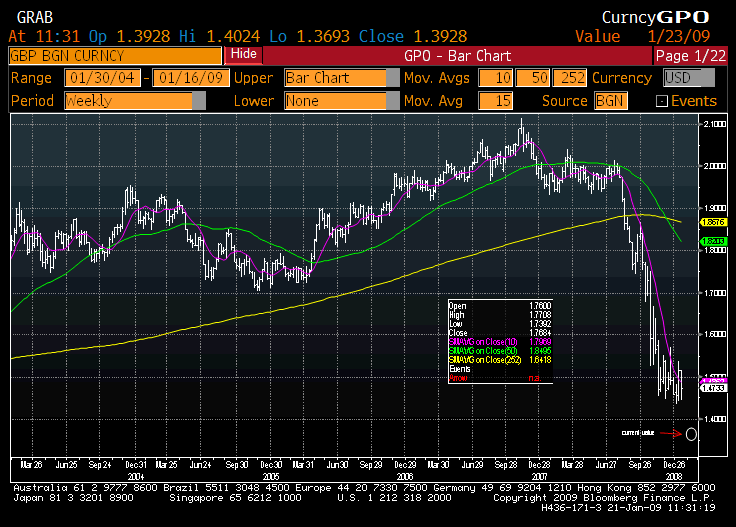I decided to write this piece because of a short post at Alea; rather than comment there, I thought I would post something slightly longer here.? Consider the similarities between the US and Britain in the current crisis:
- Accommodative monetary policies.
- Generally free-ish with respect to financial regulation and credit.
- Overleveraged housing markets after a bubble.
- Banks that felt they could hedge risks and enhance returns through structured finance and derivatives.
- Aggressive approaches to bail out financial institutions.
There’s probably more, but now I want to highlight one difference: the US Dollar is the global reserve currency and the British Pound is not.? Thus Britain, as it tries to reflate, runs up against borrowing constraints faster than the US does.? Those limits aren’t showing up in their interest rates yet, but it is showing up in the currency, which has been falling rapidly of late.
With the creation of so much liquidity out of thin air, the surprise is not that the British Pound is weak, but that the US Dollar is strong, and still regarded as a safe haven.? Then again, what are the alternatives?
The Yen?? Japan has its own problems, and their economy is not large enough to deal with all of the financial flows entailed.
The Yuan? Banking system too immature.
The Euro? Too young.? Tha current danger of the Euro is not that it will be weak, but that it might be too strong, leading to hard adjustments in Ireland, Spain, Greece, Portugal, and tangential European economies with weak fiscal policy positions.? I’ve said it before; I’ll say it again: the Euro is a noble experiment, but currency unions that are not political unions don’t typically work.? Then again, most fiat currencies eventually fail.
External commodity-based currencies?? None that I know of; few governments want to limit their power by tying their hands on monetary policy.
That leaves the imperfect US Dollar.? For now, lending to the US remains open, despite the many problems, and the paltry compensation for lending to the US Government and those that they guarantee to varying degrees.
If you live in the US, it’s a small reason for optimism that we don’t deserve, but it allows our government to borrow more.? Now, whether they will use it wisely is dubious, but things could be worse.? Ask Britain.


The alternative currency?- Why gold, of course! Sooner or later, we are going back to the gold standard.
How much longer can the US dollar remain the world’s reserve currency given our trade imbalance and our ballooning debt ?
I don’t think too long.